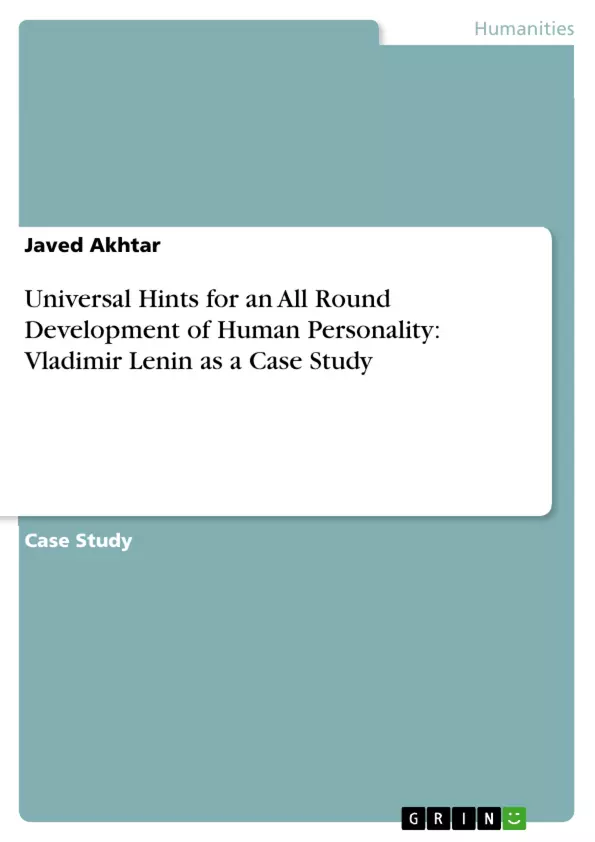The aim of this study is to investigate universal hints for an all-round development of human personality: Vladimir Lenin as a case study, in the light of Stephen R. Covey’s suggested habits, expounded in his books, “The Seven Habits of Highly Effective People” and “The 8th Habit: From Effectiveness to greatness”, following the most eminent Russian physiologist and psychologist Pavlov’s theory of classical behaviourism.
This paper adopts the popped up chunks of Pavlov’s classical behaviourist theory to analyse how the process of habit formation influences the effective and great human personalities of the world. Thus, the present study will enable the readers and researchers to confront Pavlov’s classical behaviourist theory of habit formation through conditioned and unconditioned stimuli and reflexes. Readers are also expected to abandon the bad habits and adopt the good ones.
Through infrequent but subtle universal hints which will serve as a model of effective and great human personality of the world. Applying I. P. Pavlov’s classical behaviourist theory, this paper concentrates on all round development of gallivanting and history making personality of Vladimir Lenin as a case study, who identified himself with history, and present Vladimir Lenin in novel and innovative perspective.
Inhaltsverzeichnis (Table of Contents)
- Abstract
- Introduction
- Stephen R. Covey's suggested Eight Habits
- Literature Review
- Data Analysis
- Conclusion
- References
Zielsetzung und Themenschwerpunkte (Objectives and Key Themes)
This study explores universal hints for the all-round development of human personality, using Vladimir Lenin as a case study. It examines these hints through the lens of Stephen R. Covey's suggested habits, drawing on his books, “The Seven Habits of Highly Effective People” and “The 8th Habit: From Effectiveness to Greatness,” and I. P. Pavlov's theory of classical behaviourism.
- The impact of habit formation on effective and great personalities
- The role of conditioned and unconditioned stimuli and reflexes in shaping personality
- The influence of social environment on individual development
- The application of classical behaviourism to understanding historical figures
- The importance of proactive and value-based choices in personality development
Zusammenfassung der Kapitel (Chapter Summaries)
The introduction sets the stage for the study, introducing Stephen R. Covey's contributions to leadership and organizational behaviour, and highlighting the significance of habits in shaping personality. The focus then shifts to I. P. Pavlov's classical behaviourism, examining his theory of conditioned and unconditioned reflexes as a framework for understanding human behaviour.
The second chapter delves into Stephen R. Covey's suggested eight habits, providing a detailed analysis of each habit and how it contributes to personal and professional effectiveness. The discussion highlights the importance of proactive behaviour, setting clear goals, and prioritizing principles in one's life.
The chapter on literature review provides a comprehensive overview of relevant research and literature on habit formation, personality development, and the application of classical behaviourism to understanding human behaviour.
Schlüsselwörter (Keywords)
The study's key focus is on the intersection of conditioned and unconditioned stimuli and reflexes, personality development, effectiveness, and greatness. The work utilizes the theories of Stephen R. Covey and I. P. Pavlov to explore the formation and impact of habits on shaping individuals into effective and great personalities. The study's case study of Vladimir Lenin aims to offer novel insights into the development of influential historical figures.
Frequently Asked Questions
How does Pavlov's theory apply to personality development?
Pavlov's classical behaviorism suggests that personality is shaped by habit formation through conditioned and unconditioned stimuli and reflexes, influenced by the social environment.
What are Stephen Covey's "Seven Habits"?
Covey's habits include being proactive, beginning with the end in mind, and putting first things first. They are designed to move an individual from dependence to interdependence and effectiveness.
Why is Vladimir Lenin used as a case study?
The study analyzes Lenin as a "history-making personality" to see how his habits and environment shaped his effectiveness and historical impact through a behavioral lens.
What is the "8th Habit" according to Covey?
The 8th habit is "Find your voice and inspire others to find theirs," which focuses on moving from individual effectiveness to true greatness and leadership.
Can habits be changed according to behaviorist theory?
Yes, behaviorism suggests that by changing the stimuli and reinforcing new reflexes, individuals can abandon bad habits and adopt good ones to improve their personality.
- Citar trabajo
- Javed Akhtar (Autor), 2016, Universal Hints for an All Round Development of Human Personality: Vladimir Lenin as a Case Study, Múnich, GRIN Verlag, https://www.grin.com/document/337585



